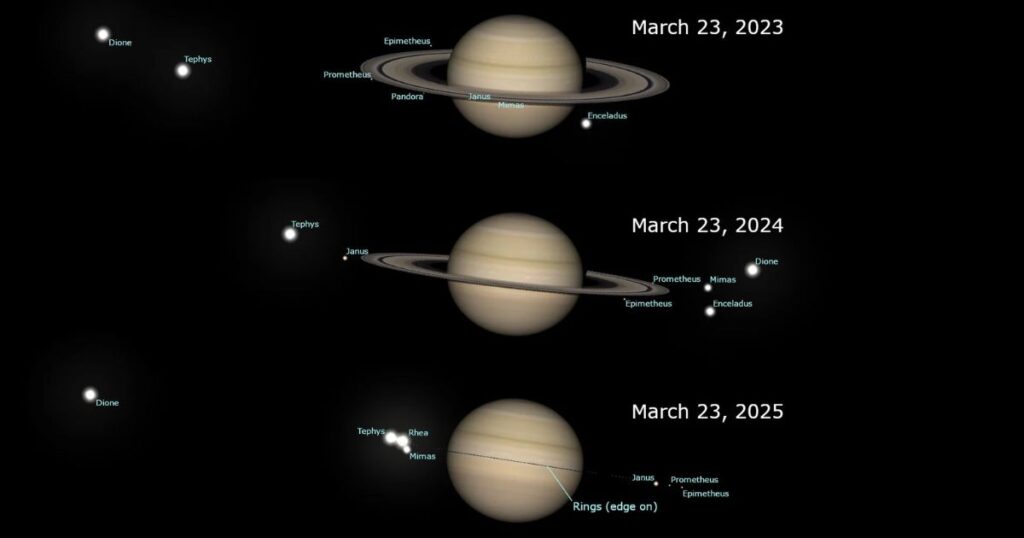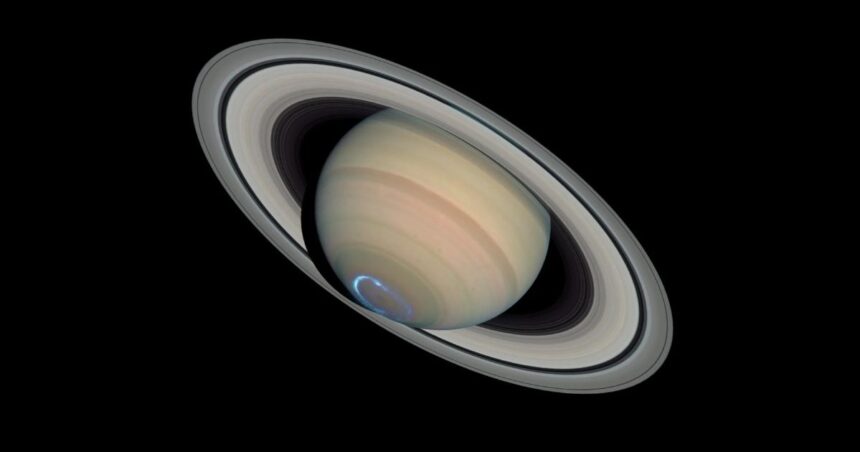NASA confirmed on November 7, 2023, that the astronomical Saturn’s iconic rings will disappear from view before March 2025. As NASA announced this news, all space enthusiasts were in shock. The term “Saturn rings will disappear” has sparked curiosity and concern.
Planet Saturn is famous for its amazing rings; it is the sixth planet in our solar system. These rings are made up of ice, dust, and rocks. A recent study by NASA found that these rings could have formed after the collision of two icy moons a hundred million years ago. Due to the unique alignment, rings will soon disappear from our view. These rings will not permanently disappear.
Why Will Saturn’s Rings Disappear?
The phenomenon of Saturn rings disappear is due to the planet’s tilt and orbit. Planet Saturn takes 29.5 years to complete its single orbit around the Sun. During this period, Saturn goes through an axis tilt, which causes its rings to appear and disappear from our view. This astronomical event occurs nearly every 15 years.
The same condition will come in March 2025, when Saturn’s rings will align edge-on with Earth. That means we will see a thin line of those giant rings, almost invisible to the naked eye. This alignment is known as the “ring plane crossing.” It is a rare event in astronomical events that occurs when Saturn’s rings are perfectly aligned with the Sun and Earth.
The Science Behind the Disappearance
Saturn’s rings spread across 282,000 km but are only about 1 Km thick. When Saturn aligns edge-on with Earth its rings will be only about 10 meters thick in visual perspective. This makes them nearly impossible to see from Earth. The rings will not actually disappear; they will just become invisible to us.

This will not be the first time Saturn’s rings have disappeared. It happened in 1995 and 2009, and each time, rings reappeared after a few months. The same thing will happen in 2025. In March, the rings will disappear, and after some months, in November 2025, the rings will reappear.
What Will Happen to Saturn’s Rings?
The disappearance of rings is for a short time; after 2025, in 2032, Saturn will reach its maximum tilt. That time, we will get the best view of Saturn’s rings. This cycle of appearing and disappearing will continue as long as Saturn orbits the Sun.
However, scientists are concerned about Saturn’s rings because they believe that they are slowly disappearing. According to astronomers, over millions of years, the planet has lost its ring component, and this will continue until it completely disappears. This losing ring process is known as “Ring rain.” In this process, ring particles fall in Saturn’s atmosphere. If this process continues, Saturn’s rings might eventually vanish completely.
How to Observe the Disappearance
This is a rare opportunity to observe Saturn rings disappear event, you need a telescope. The rings will be visible as a thin line through a telescope. It is a rare opportunity to see Saturn in a different way. Many observatories and space agencies will likely host events to observe this event.
While the temporary disappearance of Saturn’s rings is fascinating, it also raises questions about their future. Will we ever see them again in their full glory? The answer is yes, but only for a limited time. Because this event will occur again when Saturn completes an orbit around the Sun.




